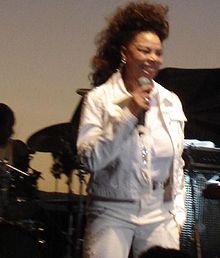- Millie Jackson
-
Millie Jackson (* 15. Juli 1944 als Mildred Jackson in Thomson, Georgia) ist eine US-amerikanische R&B-Singer-Songwriterin, die ihre größten Erfolge in den 70er Jahren feierte. Bis 1988 platzierte sie rund 40 Hits in den amerikanischen R&B-Charts.[1] Zu ihren erfolgreichsten Werken gehören die Alben Caught Up (1974), Feelin' Bitchy (1977) und Get It Out'cha System (1978), die in den USA jeweils über 500.000 Mal verkauft und mit Gold ausgezeichnet wurden.[2]
Inhaltsverzeichnis
Karriere
Nach dem frühen Tod ihrer Mutter zog Jackson zunächst mit ihrem Vater nach Newark, als Teenager lebte sie bei ihrer Tante in Brooklyn. Zunächst arbeitete sie als Fotomodell. 1969 bekam sie ihren ersten Schallplattenvertrag bei MGM Records, die einzige Single für das Label Little Bit of Something hatte allerdings keinen Erfolg. Daraufhin wechselte sie zu Spring Records, einem kleinen Spartenlabel von Polydor, und im Jahre 1971 platzierte sie mit A Child of God (It's Hard to Believe) eine erste Single in den US-amerikanischen R&B-Charts[3], die höchste Notierung war Platz 22. 1972 folgten mit Ask Me What You Want sowie My Man, A Sweet Man gleich zwei Singles in den R&B Top Ten. 1973 feierte sie mit Hurts So Good ihre erfolgreichste Single, der Titel erreichte nicht nur Platz 3 der R&B Charts, sondern auch Platz 24 der Billboard Hot 100. Der Titel erschien auch im Soundtrack des Blaxploitation-Spielfilms Cleopatra Jones.
1974 wurde sie für (If Loving You Is Wrong) I Don't Want to Be Right das einzige Mal in ihrer Karriere für den Grammys nominiert.[4] 1979 nahm sie mit Isaac Hayes das Album Royal Rappin's auf. Bis in die Mitte der 1980er Jahre konnte Jackson weitere Singles in den R&B Charts platzieren, darunter auch Coverversionen von Titeln so verschiedener Künstler wie Merle Haggard und Boney M. 1986 unterschrieb sie bei Jive Records und hatte mit Hot! Wild! Unrestricted! Crazy Love (1986, Platz 9) sowie Love Is a Dangerous Game (1987, Platz 6) weitere Singles in den R&B Charts. Letztmalig platzierte sie sich dort 1988 mit Something You Can Feel.[5]
Jackson hatte seit Ende der 1980er Jahre zwar keine größeren Verkaufserfolge mehr, allerdings ist sie durch ihre Albumcover-Motive nach wie vor im Gespräch. Das Titelbild von Back to the Shit wurde unter anderem vom britischen The Guardian als eines der schlechtesten Albencover aller Zeiten ausgewählt.[6][7]
Jackson arbeitet seit Mitte der 2000er Jahre als Moderatorin einer werktäglichen Nachmittagssendung beim Radiosender KKDA AM in Dallas. Sie ist die Mutter der Sängerin Keisha Jackson.
Diskografie
Alben
- 1972: Millie Jackson
- 1973: Hurts So Good
- 1974: I Got To Try It One Time
- 1974: Caught Up (US Albumcharts: Platz 21)
- 1975: Still Caught Up
- 1976: Free and in Love
- 1977: Lovingly Yours
- 1977: Feelin' Bitchy (US Albumcharts: Platz 148)
- 1978: Get It Out´Cha System (US Albumcharts: Platz 55)
- 1979: A Moment's Pleasure (US Albumcharts: Platz 144)
- 1979: Royal Rappin's (mit Isaac Hayes)
- 1979: Live & Uncensored
- 1980: For Men Only
- 1981: I Had to Say It
- 1981: Just a Li'l Bit Country
- 1982: Hard Times
- 1982: Live And Outrageous (Rated XXX)
- 1983: E.S.P. (Extra Sexual Persuasion)
- 1986: An Imitation Of Love (US Albumcharts: 116)
- 1988: The Tide Is Turning
- 1989: Back to the S__t!
- 1991: Young Man, Older Woman
- 1993: Young Man, Older Woman: Cast Album
- 1994: Rock'n'Soul
- 1995: It's Over
- 1997: The Sequel, It Ain't Over
- 2001: Not for Church Folk!
Singles (Auswahl)
- Ask Me What You Want (US Billboard: Platz 27)
- My Man, A Sweet Man (US Billboard: Platz 42)
- Hurts So Good (US Billboard: Platz 24)
- How Do You Feel In The Morning (US Billboard: Platz 77)
- (If Loving You Is Wrong) I Don't Want to Be Right (US Billboard: Platz 42)
- Leftovers (US Billboard: Platz 87)
- If You're Not Back My Monday (US Billboard: Platz 43)
- Never Change Loves In The Middle of The Night (US R&B: Platz 33)
- Do You Wanna Make Love mit Isaac Hayes
- Act of War mit Elton John
Einzelnachweise
- ↑ Allmusic
- ↑ Recording Industry Association of America
- ↑ [start=2&tx_bsprintimport_pi1[single]=996&tx_bsprintimport_pi1[back]=18&no_cache=1 Backspin]
- ↑ Thomas O'Neil: The Grammys - The Ultimate Unofficial Guide to Music's Highest Honor, A Variety Book, USA 1999, Seite 223
- ↑ Allmusic
- ↑ Guardian
- ↑ Virgin Media
Weblinks
Wikimedia Foundation.

